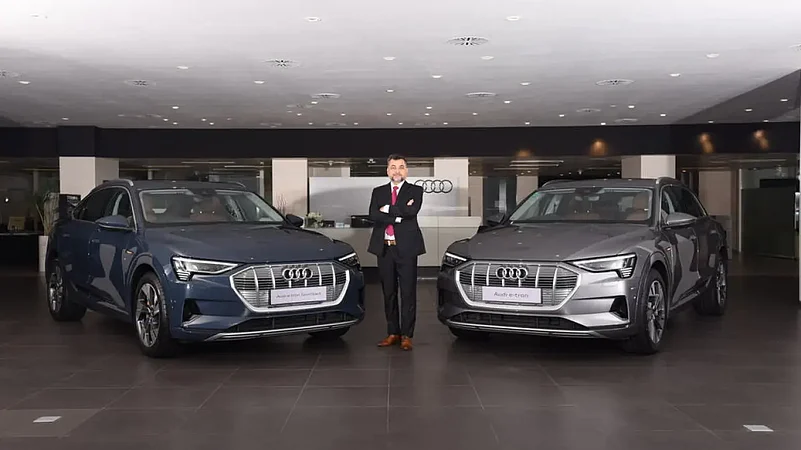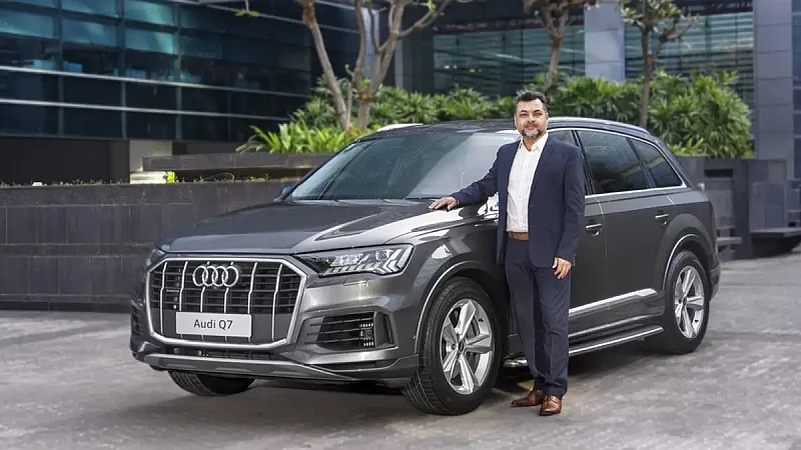You may soon spot Audi's India-made electric cars as the company says "it's a matter of time" before it starts making these cars in India.
With Electric vehicle (EV) sales on the rise, several automakers are looking to widen their portfolio in the country. But before that, the government wants them to make electric vehicles in India.
The government had last year urged local carmakers to curb imports of EV components and other automotive parts from China and instead set up manufacturing facilities in India.
Automakers are also reeling under a semiconductor shortage due to Covid-19-related restrictions globally disrupting supply chains. The ongoing Russia-Ukraine crisis has further worsened the supply-chain, as both Russia and Ukraine are key suppliers of the raw materials required for chip making.
In a conversation with Outlook Business, Balbir Singh Dhillon, Head of Audi India, speaks about the impact of the semiconductor shortage on the auto sector, import duty cuts, electric vehicles, and pre-owned car business in India.
Here are the edited excerpts:
Do you think the chip shortage will go on and what are the challenges for the automakers at present?
The chip shortage has hit the whole auto sector and also many other industries globally. But the biggest challenge which we face is uncertainty. In the luxury segment, the planning cycles are very long, we have to plan, nine months to one year, even beyond. The challenge is we are not able to predict how many cars we will get in the next couple of months.
We continue to get feedback from our headquarters on a weekly basis on the upcoming production but there is no doubt about it, some of our products are on waiting period which is longer than usual.
Do you think that the current situation, the Russia-Ukraine war, and the chip shortage, are going to make automakers redraw their plans?
It's a fact that the whole world is connected, the supply chains are across the globe. Auto is something where there are thousands of components in each product that comes out of production and which is completely ready for customer delivery.
There are interlinkages from each country by and large, directly or indirectly, so there is no doubt there are disruptions when anything like this happens.
We have yet to see any specific impact on our business at present but it's fair to say there will be an impact globally. The transportation costs and the shipping costs have gone over the roof in the past couple of years, and the current situation is not going to help. It's only going to make it worse.
So, these challenges do create problems for the supply chain and also put pressure on our pricing as the raw material and labor costs are going up.

Do you think price hikes on cars would impact the demand in some manner?
Audi has been keeping the pricing competitive for the past many years and as far as possible, we try to absorb the costs. But when it's beyond absorption, we have to pass this on.
It's only when there is a compelling situation where the cost needs to be passed on to the customers, we eventually take those calls.
In general, you have to look at the cost increase in relation to inflation. So if I put the price increase of our cars vis-a-vis the inflation that our country normally has, I think the price is below in terms of that and it's in line with the inflation, so I don't see that to be impacting the volumes too much.
Audi's performance was good in 2021, what are your predictions for 2022?
We started the year on a very positive note and are looking for double-digit growth this year as well. But as I said, this is again a developing situation where we are faced with certain challenges in terms of global disruptions. But so far, we are selling a decent number of vehicles every month.
But going forward there are definitely uncertainties. I think with the new products that we've launched, including the Audi Q5, and the recently launched Audi Q7 coupled with the products to be launched this year and all the five electric cars that we have in the market, there is a positive demand and I do see a good growth this year as well.
But we will have to take this information with a pinch of salt due to uncertainties.
How far has the response been for Audi EVs? What are the plans now? And will there be cheaper cars in the future?
Last year, we launched five electric cars in India within a span of about three months. We just wanted to show the confidence that we have in the market, and it was actually aligning with our strategy where we move from petrol plus diesel technology to petrol and electrification technology. This is what we decided way back in 2020 so we wanted to show we are confident about the country where electric mobility will move very fast.
So far, the response has been amazing. If we had two times the cars that we imported we would have sold those many cars as well. But when you do business planning, you have to be careful that you're not overdoing it. So we started at a good pace and it's continuing still. Most of the cars that we are getting every month, they're already pre-sold to our customers, so there is a very positive response.
But yes, at this point in time, the cars we are selling are mostly above Rs 1 crore, so we are addressing only one segment of the customers and not the entire segment.
Going forward, we do have plans of bringing more products to the country. But that will happen in some time, maybe next year or the years to come, but we definitely have plans to widen our portfolio in electric mobility.
Do you think the prices of petrol and diesel are going to make more people switch to electric cars in the coming time?
My logical answer is yes. But to some extent, I think in the luxury space, fuel costs are one of the few factors due to which the decisions are made.
But more than that, people are embracing the new technologies. The younger generation is impacting the decisions of their family members to buy these cars. So I think it's beyond the fuel prices. It is about emotions, being green, and also being the first one to embrace this technology and the first one to own these set of cars.
It's a multitude of factors that are impacting the purchase of these cars and fuel is just one of them.
Tesla has raised the demand for import duty cuts. If the government agrees to do so, do you think that will make the path easier for all the luxury car makers?
Absolutely, it's a fact that there is a volume at every price point so if the import duties go down, obviously the price points go down.
And with the price points going down the volumes tend to grow, and it is not in the same proportion. If you reduce the import duties by 20 per cent, it's not that the volume will grow by 20 per cent; perhaps the volume will go by 40 per cent. So it is disproportionate growth to the price percentage or the import duty price reduction.
I am sure the government will take the wise decision and not just for one or two manufacturers because we have also invested in the country and we've invested with huge capacities. This government decision helps us reach those certain minimum threshold volumes and makes our negotiations easier with our headquarters to also start thinking of making these cars in India.
Otherwise, with this kind of import duty, maybe it'll take much more time for us to decide for bringing these cars to India. If we could do this early, it is better.
Any plans to make electric cars here?
Without reference to any timelines, I would say Audi has already decided to become a fully electric car company by 2033 so it's a matter of time before we will start making these cars in India.
We still have about 10 years to go; we'll still continue to sell IC engine cars. We have to take a call at some point in time, to start making these cars. So the early we're able to reach those threshold volumes, the early we can start making those cars in India. But everything is open on the table, nothing decided.
I always say it is a question of when, and not the question of 'if' we will make in India, that's how it will remain to be.
Everything is being evaluated, whatever makes a positive business case we will look at it.

A lot of carmakers are focussing on SUVs, do you see Audi would focus on this particular segment, or will it be equally focusing on all the segments?
In the luxury segment, the sales between SUVs and sedans are almost half-half, and that's how it remains because a lot of customers are still chauffeur-driven in our country where the demand for sedans is high.
And on the self-driving side, the demand for SUVs is high, so the luxury space here is divided equally.
There is an equal focus on both body types and one has to have both to offer to customers, we are bringing not just SUVs, but we are also trying to make new experimentation. For example, with each Audi e-Tron we also have a sport-back version so that's a different body type, which is away from SUV and sedan. It's something which a lot of customers are really liking.
India has a large percentage of young population who are ready to experiment with new body types, but in general, I would say the demand still is 50-50.
Tell us about the pre-owned car business.
Audi Approved:plus is doing well and it's purely a separate vertical that works by itself and supports us, our customers, as well as our partners. As far as we're concerned, we are able to bring in more customers into our fold even before they buy a new car, so for us, it's easy to give Audi experience to the first-time buyers and, of course, they also become a potential buyers of the new cars going forward.
For our existing customers, it helps because they are able to sell their cars through our channel with ease as they don't have to go to brokers.
Last year we increase the number of (pre-owned) Audi Approved:plus showrooms from seven to 14 already, and this year we intend to take them further up to 20. Pre-owned car businesses are a win-win for all.
How do you see the picture for the luxury segment in the next 3-5 years?
I think the situation that we're facing currently whether it is the semiconductor shortage or the (Russia-Ukraine) war situation, these are all temporary things. Whenever there is a shortage, there is always an opportunity to do the same business somewhere else.
Business is like water, it will find the right way to move around, so if there is a problem in one location, there will be a solution somewhere else.
As far as the luxury segment goes, it is just 1 per cent of the overall car segment, we do see positive growth in coming years in the luxury space.































